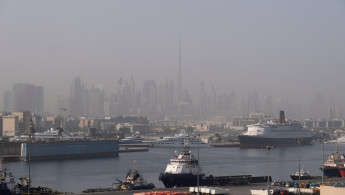As Dubai hosts climate talks, its air pollution soars
Dubai's glitzy skyline was obscured by a blanket of smog rated as "unhealthy" on Sunday as thousands of delegates attended a COP28 conference dedicated to the harmful effects of air pollution.
The air quality index reached 155 micrograms per cubic metre of PM2.5 pollution -- the fine particulate matter that is most harmful, as it can enter the bloodstream -- according to WAQI.info, a real-time pollution tracker.
In "unhealthy" air quality, "everyone may begin to experience health effects; members of sensitive groups may experience more serious health effects," the website warns.
Hazy conditions have been noticeable over the first few days of the UN's COP28, where negotiators are trying to hammer out a global agreement to reduce emissions and curb climate change.
About 80,000 people are registered to take part in the biggest edition yet of the UN climate talks in the United Arab Emirates, one of the world's biggest oil producers.
Sunday is designated as "health" day at COP28, where topics under discussion include air quality and the unhealthy effects of climate change.
Outdoor air pollution driven by fossil fuel emissions kills more than four million people a year, according to the World Health Organization, as it increases the risk of respiratory diseases, strokes, heart disease, lung cancer, diabetes and other problems.
The damage is caused partly by PM2.5 microparticles, which mostly come from fossil fuels burned in transportation and industry.
COP28 is unfolding about 11 kilometres (seven miles) from the Jebel Ali Power and Desalination Complex, the world's biggest gas-fuelled power station.
Other polluters nearby include Jebel Ali port and Al Maktoum international airport, while about 200 kilometres (124 miles) west lies Abu Dhabi's Bab oil field.





 Follow the Middle East's top stories in English at The New Arab on Google News
Follow the Middle East's top stories in English at The New Arab on Google News


